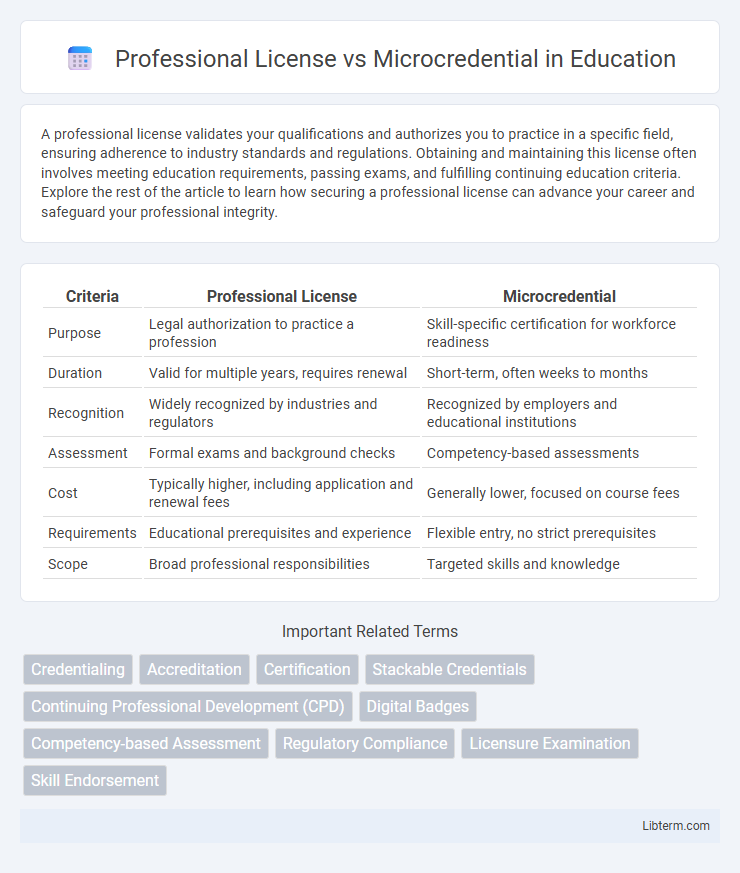A professional license validates your qualifications and authorizes you to practice in a specific field, ensuring adherence to industry standards and regulations. Obtaining and maintaining this license often involves meeting education requirements, passing exams, and fulfilling continuing education criteria. Explore the rest of the article to learn how securing a professional license can advance your career and safeguard your professional integrity.
Table of Comparison
| Criteria | Professional License | Microcredential |
|---|---|---|
| Purpose | Legal authorization to practice a profession | Skill-specific certification for workforce readiness |
| Duration | Valid for multiple years, requires renewal | Short-term, often weeks to months |
| Recognition | Widely recognized by industries and regulators | Recognized by employers and educational institutions |
| Assessment | Formal exams and background checks | Competency-based assessments |
| Cost | Typically higher, including application and renewal fees | Generally lower, focused on course fees |
| Requirements | Educational prerequisites and experience | Flexible entry, no strict prerequisites |
| Scope | Broad professional responsibilities | Targeted skills and knowledge |
Understanding Professional Licenses
Professional licenses are government-issued credentials that certify an individual's authority to practice a specific profession, such as medicine, law, or engineering, ensuring compliance with regulatory standards and public safety requirements. These licenses often require passing state exams, completing rigorous education, and fulfilling ongoing continuing education to maintain validity. Professional licenses hold legal significance and are mandatory for employment in regulated industries, distinguishing them from microcredentials, which are typically voluntary certifications focused on skill enhancement.
What Are Microcredentials?
Microcredentials are digital certifications that validate specific skills or competencies in a focused area, often earned through short courses or training programs. Unlike professional licenses, which are mandatory credentials regulated by government or professional bodies to legally practice a profession, microcredentials serve to enhance expertise and employability without replacing formal qualifications. They offer flexibility and targeted learning opportunities aligned with industry needs, enabling continuous professional development and skill specialization.
Key Differences Between Professional Licenses and Microcredentials
Professional licenses are government-issued certifications that validate an individual's legal authority to practice in regulated fields such as medicine, law, or engineering, often requiring extensive education, exams, and ongoing renewal. Microcredentials represent specialized, skill-specific certifications obtained through shorter courses or training programs, aimed at enhancing particular competencies without the broad regulatory oversight of professional licenses. Unlike professional licenses, microcredentials offer flexibility and are frequently used for career development and skill validation in dynamic industries like technology and digital marketing.
Industries Requiring Professional Licenses
Industries such as healthcare, engineering, law, and accounting mandate professional licenses to ensure practitioners meet strict regulatory standards and maintain public safety. These licenses require extensive education, examination, and ongoing certification, distinguishing them from microcredentials that provide specialized, shorter-term skill training without legal authority. Microcredentials complement professional licenses by enhancing specific competencies but cannot replace the comprehensive validation needed for regulated professions.
Fields Embracing Microcredentials
Fields such as information technology, healthcare, and education are increasingly embracing microcredentials for skill validation due to their flexibility and industry relevance. Unlike professional licenses, which often require extensive formal education and regulatory approval, microcredentials offer targeted, competency-based recognition that aligns with rapidly evolving job market demands. This shift enables professionals to upskill quickly and demonstrate specific expertise in emerging technologies and methodologies.
Recognition and Validity: Licenses vs Microcredentials
Professional licenses are government-issued certifications that validate an individual's qualifications to perform specific job functions, ensuring legal compliance and widespread recognition across industries. Microcredentials are digital badges or certificates that demonstrate mastery of specialized skills or knowledge, often issued by educational institutions or employers, but they typically lack the formal regulatory authority and universal acceptance of professional licenses. While licenses carry significant legal weight and long-term validity, microcredentials offer flexible, skill-focused recognition that may require frequent updating to maintain relevance.
Time and Cost: Earning a License vs a Microcredential
Professional licenses often require extensive education and multiple years of work experience, leading to higher time and financial investment, sometimes costing thousands of dollars in tuition, exam fees, and continuing education. Microcredentials can be earned in weeks or months and typically cost significantly less, ranging from a few hundred to a thousand dollars, making them more accessible for professionals seeking quick skill validation. The shorter duration and lower cost of microcredentials offer a practical alternative for upskilling without the long-term commitment associated with traditional professional licenses.
Career Impact: Which Opens More Doors?
Professional licenses, often required by regulatory bodies, validate a standardized level of expertise and legal authority in fields like healthcare, engineering, and law, directly enabling career entry and advancement. Microcredentials offer targeted skill enhancement and industry-relevant competencies, appealing to employers seeking specific expertise and supporting career agility in fast-evolving sectors such as technology and digital marketing. While professional licenses open doors to regulated professions with mandatory certification, microcredentials provide competitive advantages through flexible skill validation, often accelerating career transitions and growth in emerging fields.
Renewal, Maintenance, and Continuing Education
Professional licenses require periodic renewal, often mandating proof of continuing education credits to ensure compliance with updated industry standards. Microcredentials typically have flexible renewal policies or may not require renewal, focusing on skill validation through completed courses rather than ongoing education. Maintenance of professional licenses involves structured reporting and often fees, whereas microcredentials emphasize ongoing skill acquisition without formal renewal procedures.
Choosing the Right Path: License or Microcredential?
Choosing between a professional license and a microcredential depends on career goals and industry requirements. Professional licenses, such as a CPA or RN, provide government-recognized validation necessary for practicing certain professions, ensuring compliance with regulatory standards. Microcredentials offer targeted skill development and flexibility, ideal for continuous learning and specialization in emerging fields without the extensive process of licensure.
Professional License Infographic

 libterm.com
libterm.com